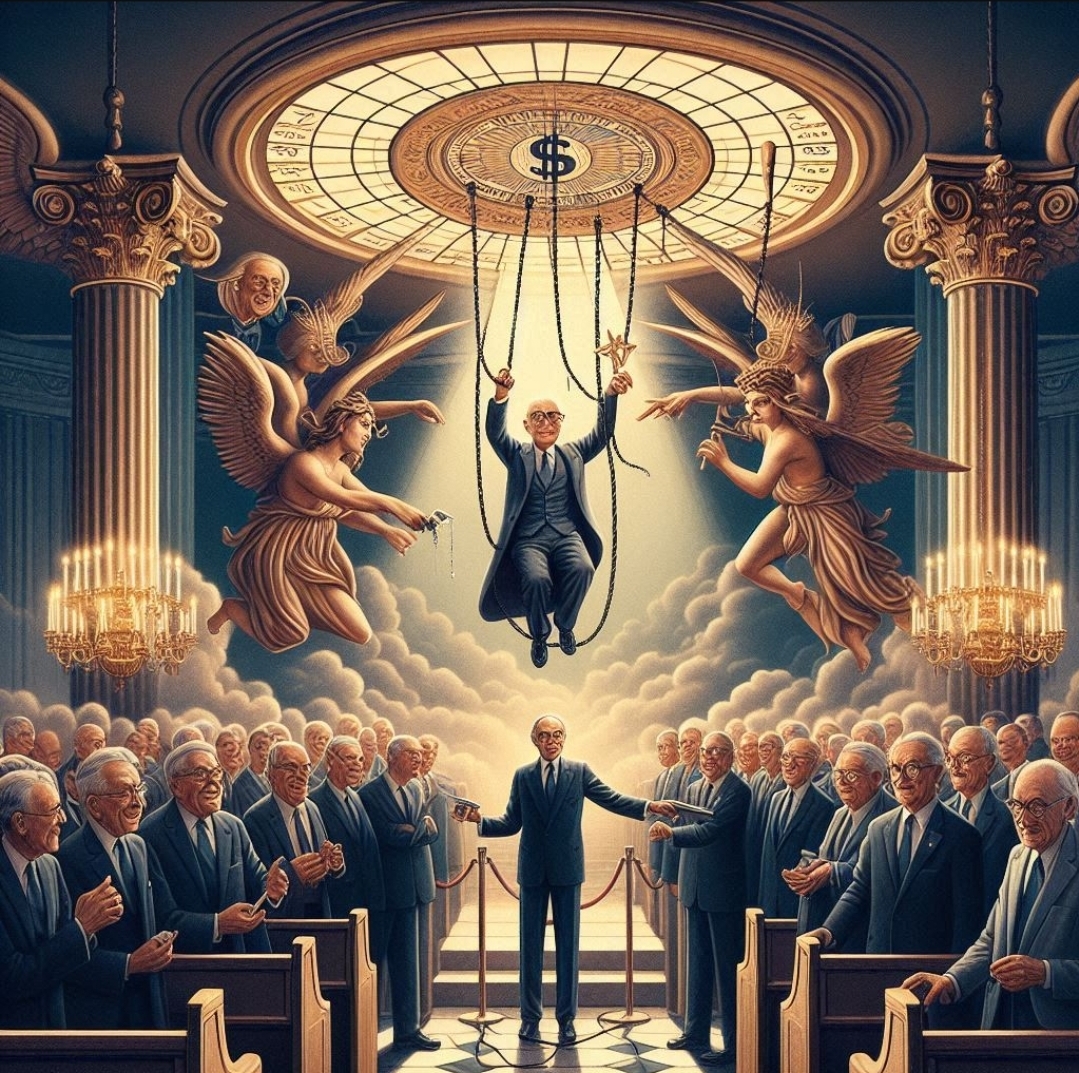Subtitle: From Revival to Regulation—The Subtle Collapse of Spirit under Philanthropic “Progress”
Introduction: Religion as the Last Frontier of Influence
For empires to endure, they must not only command economies and armies—they must also shape belief. This is why every regime, from Rome to modern America, has eventually turned its eye toward religion.
While many have focused on John D. Rockefeller’s domination of oil, medicine, and education, few realize that he also strategically infiltrated the American church, especially mainline Protestantism, to convert it from a spiritual compass into a managerial appendage of elite power.
By redefining theology, redirecting seminaries, and reframing the Gospel, Rockefeller helped transform Christianity from a radical force of truth and conscience into a moral bureaucracy aligned with corporate, globalist, and statist goals.
Context: The Power of the Protestant Pulpit
In 19th and early 20th century America, the church was more powerful than the university, the press, or the state when it came to shaping public morality.
Pulpits ignited:
- The abolitionist movement
- Temperance
- Anti-war sermons
- Grassroots care for the poor
- Emphasis on personal salvation and moral responsibility
In short, the church was a wildcard—not fully under elite control. It often stood as a check against greed, corruption, and empire.
To Rockefeller and his peers, this independence was dangerous.
Enter the Rockefeller Religious Strategy
Rockefeller, a devout Baptist by upbringing but a ruthless monopolist by practice, understood religion’s cultural influence. In the early 1900s, he began channeling his immense wealth into religious institutions—but not for the purpose of piety.
Key Institutions Funded:
- Union Theological Seminary (New York)
- The Federal Council of Churches (which later became the National Council of Churches)
- Theological departments at elite universities (Harvard Divinity, University of Chicago Divinity School, etc.)
Through the Rockefeller Foundation and Laura Spelman Rockefeller Memorial Fund, Rockefeller engineered a soft theological coup.
The “Social Gospel”: From Personal Redemption to Social Regulation
One of Rockefeller’s most effective ideological tools was the Social Gospel Movement—a theological shift that emphasized societal reform over spiritual rebirth.
Key Themes of the Social Gospel:
- Replace focus on personal sin with focus on social systems.
- Emphasize service, charity, and institutional reform over inner transformation.
- Redefine salvation in terms of political and economic progress.
While the Social Gospel sounded noble, it subtly replaced transcendence with technocracy. Churches began to:
- Endorse progressive government policies.
- Downplay divine authority in favor of humanist cooperation.
- Embrace scientific management, efficiency, and bureaucracy as virtues.
In short, the church stopped resisting the system—and began administering it.
Union Theological Seminary: The Rockefeller Prototype
Founded in 1836 but radically reoriented by Rockefeller money in the 1920s, Union Theological Seminary became the flagship for this new religion of “enlightened control.”
Notable Outcomes:
- The embrace of liberal theology, including rejection of biblical inerrancy.
- Promotion of Marxist-aligned liberation theology, which replaced spiritual truth with class struggle.
- Training clergy to become social managers rather than prophetic voices.
As Union went, so went many other seminaries—transforming ministers into bureaucratic diplomats serving cultural consensus instead of divine conviction.
Rockefeller and the National Council of Churches
In 1908, the Federal Council of Churches was established with Rockefeller funding. It later became the National Council of Churches (NCC), a massive umbrella group representing dozens of mainline Protestant denominations.
NCC’s Evolution:
- Shifted church focus from salvation and Scripture to activism and policy alignment.
- Partnered with globalist institutions like the UN and the World Council of Churches.
- Advocated for causes aligned with elite liberalism, not Christian orthodoxy.
Churches became arms of social planning, not communities of conviction.
Theological Impacts: The Death of the Sacred
As Rockefeller funding spread through seminaries and denominational leadership, core tenets of Christianity were subtly undermined:
| Historic Christianity | Rockefeller-Influenced Religion |
|---|---|
| Sin as moral/spiritual rebellion | Sin as ignorance or maladjusted behavior |
| Christ as Savior and Lord | Christ as social example or activist |
| Salvation as spiritual rebirth | Salvation as social harmony |
| Prophetic confrontation with injustice | Managed dialogue with institutional power |
| Divine authority above all | Consensus and cultural adaptation |
The result? A generation of clergy trained to appease, not to awaken.
Control Through Charity: The Trojan Horse of Philanthropy
Rockefeller’s method wasn’t coercion—it was patronage.
He didn’t demand control. He simply offered money—with strings:
- Grants to seminaries in exchange for curriculum “modernization”
- Endowed chairs to promote “scientific religion” and “rational ethics”
- Partnerships with government to align faith with public policy
Churches were not forced to conform. They were rewarded for compliance.
Silencing of Dissent: The Marginalization of Prophetic Voices
As elite funding standardized theology, prophetic Christianity—the kind that speaks truth to power—was slowly exiled:
- Black churches that resisted elite narratives were defunded or surveilled.
- Charismatic and revivalist movements were branded as “extremist” or “irrational.”
- Independent churches that refused government partnerships were denied tax status or media legitimacy.
Meanwhile, conformist churches were given prime real estate—literally and figuratively—in shaping public conscience.
Cultural Consequences: Churches as Gatekeepers, Not Shepherds
By the mid-20th century, the fruits of Rockefeller’s religious intervention were evident:
- Sermons resembled TED Talks more than scriptural exhortation.
- Churches promoted political ideologies over divine truth.
- Christians became consumers of moral comfort, not disciples of sacrificial obedience.
- The moral authority of the church collapsed, opening the door to nihilism, relativism, and spiritual apathy.
In this vacuum, celebrity pastors replaced shepherds. Marketing replaced ministry. And the church became just another brand in the American ideological marketplace.
Final Reflection: When Churches Stop Preaching and Start Performing
Rockefeller’s genius wasn’t in destroying religion—it was in capturing and repurposing it. He didn’t banish God. He simply rebranded Him as a social manager.
And in doing so, he helped construct a society where:
- Spiritual hunger is medicated by slogans.
- Eternal truths are diluted for mass appeal.
- Moral resistance is replaced by moral relativism.
But just as God called prophets to confront the false priests of Israel, He is still calling voices today to stand against the manufactured spirituality of our time.
Conclusion: The Church Must Return to the Wilderness
If the church is to be salt and light again, it must:
- Renounce elite funding and state partnerships.
- Return to the authority of Scripture over consensus.
- Train ministers as prophets, not PR agents.
- Preach Christ crucified—not capitalism baptized or socialism sanitized.
Only then can the church reclaim its role as the conscience of the nation—not its chaplain.







